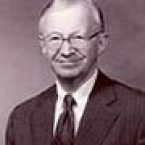
Martin Lipkin, MD, professor of medicine at Weill Cornell Medical College in New York, died in February 2014, at the age of 87. Lipkin, a pioneer in the fields of colorectal pathogenesis and chemoprevention, was an AACR member for 51 years.
He was a committed member of the AACR, which he first joined in 1963. He had served as associate editor of Cancer Research, editorial board member of Cancer Epidemiology, Biomarkers & Prevention, chair of the Cancer Prevention Committee, and a member of the Research Grant Review Committee. Additionally, he was a supporter of the AACR-Irving Weinstein Foundation Distinguished Lectureship.
Lipkin was recognized for his efforts involving cancer prevention research and as a pioneer in the use of computers in medicine. He demonstrated the first automated correlation and processing of medical information and introduced computers into clinical medicine and medical research.
He was the first to identify and measure DNA synthesis, cell proliferation kinetics, and cell renewal in humans. From these findings, Lipkin developed a multistep molecular model of carcinogenesis and a series of cellular biomarkers associated with the evolution of cancer. He also developed the first comprehensive high-risk registry of individuals with increased susceptibility to colon cancer, and with it the first translational research project at Memorial Sloan Kettering Cancer Center. This new ability to study cellular biomarkers in individuals with increased cancer susceptibility enabled investigators to study large numbers of new agents to inhibit human tumors, leading to a broad expansion of human clinical trials in the cancer chemoprevention field.
He also published the first textbooks on the subjects of gastrointestinal cancer and tumor prevention by nutritional and pharmaceutical chemopreventive agents. He carried out the first study that suggested increasing dietary calcium and vitamin D showed efficacy as potential chemopreventive agents by inhibiting human benign and malignant colonic tumors. In recent years, Lipkin’s studies focused on the chemopreventive inhibition of tumors in preclinical wild type and genetically modified rodent models.
In addition to the AACR, Lipkin was a member of numerous medical societies, as well as a founding member of the International Society of Investigative Gastroenterology, the Digestive Disease Foundation, the National Cancer Institute’s (NCI’s) Organ Site Program, and NCI’s National Large Bowel Cancer Project.
Throughout his career, Lipkin’s work had been recognized with numerous honors, including appointment as nominator for the Nobel Prize in Physiology or Medicine, the Medallion of the National Cancer Center of Japan, the Chao Distinguished Lectureship of the University of California, the Elise Strang L’Esperance Leadership Award, and the Albert F.R. Andresen Award of the Medical Society of the State of New York.
Be the first to add a Remembrance.